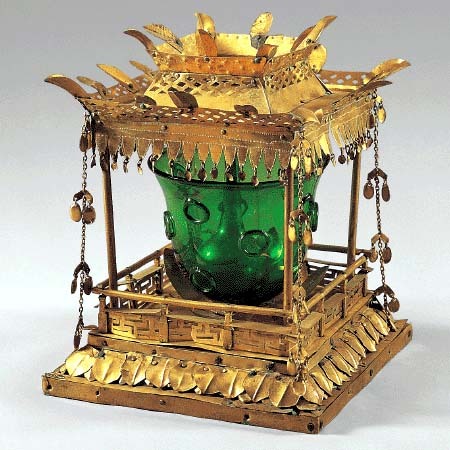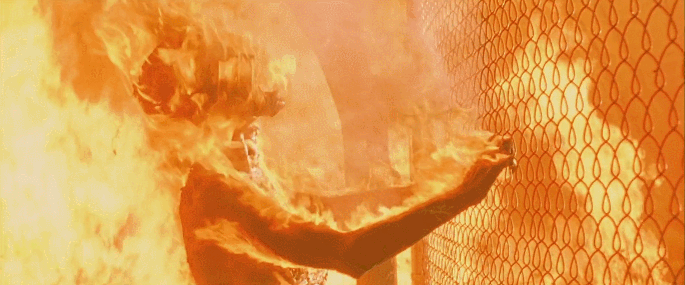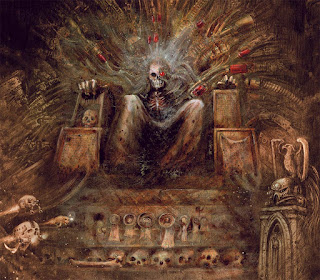Spellcasters in Belswick have to buy or find new spells in stead of getting them for free when they level, which means that I have to look ahead and drop spellbooks every now and again. Tedious work. Much easier to have them sort this out themselves. Rather than revoke, I'll patch and try to tie this into the rules for characters growing rich off of dungeoneering.
SHRINES, LABS AND LIBRARIES
Standing house rule: all my spellcasters except nature types have to earn their spells, they don't get new spells whenever they level. By collecting tools of the trade, they can now outfit a workshop to experiment and learn new tricks.Shrines are for divine casters (clerics, some bards), libraries are for arcane casters (some bards, sorcerers, warlocks and wizards) and laboratories are for potion brewers. Each type of workspace has a couple of suggested items to stock it with - use this as a starting point and get your player's input on what they'd like to furnish their workspace with.
As a bonus, most of this stuff is fragile or hard to move, meaning you need a place to store it - save up for that home base!
LABORATORY
Includes a basic workshp with glasswork and supplies, but also recipe books and rare components.Gain two potion recipes every time you gain a level. You can benefit from only one laboratory each time you level up. Must have the ability to brew potions (potionmaking skill) to benefit from a lab.
- common laboratory: 100 gp, common potion recipes
- uncommon laboratory: 250 gp, uncommon potion recipes
- rare laboratory: 500 gp, rare potion recipes
- very rare laboratory: 1000 gp, very rare potion recipes
- legendary laboratory: 2000 gp, legendary potion recipes
 |
| From Life of the Party - Realities of an RPGer |
Lesser books
Value is 25-50 gp, depending on the state of the copy, quality of notes in the margins etc.
- Sprinkwurtle's Arcanofauna - wildly speculative book on cryptids
- The Hermetic and Alchemical Writings of Aureolus Philippus Theophrastus Bombastus von Hohenheim - self-aggrandizing pamflet on the claimed workings of Paracelsus the Great
- The Sage's Garden - primer on herbalism
Greater books
Value is 50-100 gp, depending on state of the copy, missing pages etc.
- A Discourse of Fire and Salt - on refining alchemical components
- Essences and Transfusions - on distillation and transferal of properties
- The Book of Smokeless Fire - Almad poems on alchemical recipes
- The Sorcerer's Stone - on spiritual and bodily ascension
- The Transmutation of Metals - on chemical processes
- The Triumphal Chariot of Antimony - on substances acidic, caustic and hypergolic
- The Wise-Man's Crown - methods of distillation and divination
- Transformatica - alterations of the physical body
Equipment
- Basic alchemist's supplies - 50 gp
- Basic herbalism kit - 5gp
- Basic poisoner's kit - 50 gp
- Apothecary drawer - 15 gp
- Brazier - 20 gp
- Glassware - 10 gp
- Hourglass - 15 gp
- Mortar and pestle - 10 gp
- Notebook - 5 gp
- Herb garden - 25 gp
- Tripod and cauldron - 20 gp
Weird - 250gp
Organs of magical creatures or shoots of magic plants, such as but not limited to:
- Vial of basilisk's blood
- Bundle of manticore spikes
- Beaker of green slime
- Mandrake beds
- Lotus hothouse
- Cage with magical beast - cost and value to library is equal to half MM XP value
- other alchemists bought: blight, crawling claw, darkmantle, doppelganger, fungi, ghoul, homunculus (2x value), mephit, pixie, fire snake, slaad tadpole, sprite,
- 2x cost for extra containment: (the "you fool" catalog) banshee, basilisk, blink dog, cockatrice, chimera, cloaker, couatl, displacer beast, dragon wyrmling, ghost, gibbering mouther, griffon, green or sea hag, hippogriff, intellect devourer, manticore, nothic, ooze, phase spider, rust monster, succubus/incubus, troll in jar of acid, unicorn, water weird, will-o-wisp
LIBRARY
Includes reference works, permanent components to meditate with, weird items to experiment with, and so on. A transmuter might also look at laboratory equipment for their alchemical studies.Gain two free spells for your spellbook each time you gain a level in bard, sorcerer, warlock or wizard. You can benefit from only one library each time you level up. Numbers are chosen so that they are cheaper than buying two spells from a wizard college (50 gp/spell level).
- bookshelf: 100 gp, level 1 spell (GLOG: school spells 1-6)
- small library: 250 gp, level 1-2 spells (GLOG: school spells 1-8)
- library: 500 gp, level 1-3 spells (GLOG: school spells 1-10)
- extensive library: 1000 gp, level 1-4 spells (GLOG: N/A)
- major library: 2000 gp, level 1-5 spells (GLOG: all school spells except Emblems)
- immense library: 5000 gp, level 1-6 spells (GLOG: 1 Emblem spell per level)
- arcane spells of level 7-9 are forbidden lore in Belswick. Outfitting a forbidden library to study these spells would take 50,000 gp at least. If you're not playing with the top levels cut off, go with 6000, 7000, 8000 gp for spell levels 7, 8 and 9.
 |
| By Redjarojam |
Lesser books
Value is 25 - 50gp, depending on the state of the copy, quality of notes in the margins etc.
- Arcane Resonances - on amulets, perfumes and tattoos to enhance spellcasting
- Galen's Anatomy - early text about the body's organs
- Kriptografi - ciphers and decryption methods
- Lorebook of Pigments - ingredients of magical inks
- The Arcane Consequence - on the morality of magic
- The Complete Draconic Lexicon - dictionary for High Xarsic with detailed etymology
Greater books
Value is 50 - 100 gp, depending on state of the copy, missing pages etc.
- De Humani Corporis Fabrica - identifying and altering the body's energy flows
- Dictionary of Lamtis Vahl - a rearranging matrix of sublinguistics to match every tongue
- Legends of Sepulchral and Perpetual Lamps - on evocation and dismissal of spirits
- Mage Illeswyte’s History Arcanum - facts of wizardry’s origins and development
- Principles of Higher Art - papers on theoretical aspects of arcane magic
- Spellcrafting journal - personal diary of meticulous wizard attempting to create new spells
- The Ancient Mysteries of the Alabaster Tower - details a forgotten magical tradition
- The Exact and Subtle Art - on astrology and the paths of heavenly bodies
- The Intermingling of the Great Lords - on children begotten by a mortal and a devil
- The Origin of Magic - myths that explain how magic came into the world
- The Roll of Spells - tiny, precise script lists the names and effects of thousands of spells
Proscribed books
Value is 200 gp. These books are rare and dangerous to own.
- A Plea for Necromancy - addresses prejudices against necromancy
- Carved tablet of gray stone - ancient practices and instructions for binding outsiders
- Lord Ilgraine's Last Command - tale of a knight and his beguiling ways
- The Courtier's Gift - on weaving illusions
- The Darke behind the Starres - work on contacting and conjuring eternal spirits
- The Iron Codex - black iron sheets strung together with chains - diagrams for planar travel
- The Lost Divinities - speculation on deceased or vanished deities
- Through the Gate of the Silver Key - outlines a deeply troubling cosmology
Equipment
To study or just to decorate your library with. Prices range up to 5x higher for ornate versions made out of rare materials.
- Astrolabe - 40-200 gp
- Globe (very incomplete) - 60-300 gp
- Gnomon (sundial) - 10-50 gp
- Labelled skeleton - 70-350 gp
- Sextant - 25-125 gp
- Stuffed alligator - 30-150 gp
- Telescope - 500-2500 gp (the Church does not like you spying on the angels above)
- Telluric Arm - 700-3500 gp - uses vibrations in the earth to sketch maps of what lies beneath
Spell components
Components like these are not consumed during casting and may be used to get insight into the workings of magic. (GLOG: different spell system, no costly components for most spells. Keep the Clone vat and Scrying vessel, at 500 gp each.)
- Chromatic Orb - diamond - 50gp
- Clairvoyance - glass sphere or jeweled horn - 100gp
- Clone - sealable incubation vessel - 2000gp (proscribed spell)
- Gate - perfect diamond - 5000gp (proscribed spell)
- Identify - pearl - 100gp
- Legend Lore - four carved ivory strips - 200gp
- Magic Jar - ruby that draws in light - 500gp (proscribed spell)
- Plane Shift - tuning fork - 250gp (proscribed spell)
- Scrying mirror or basin - 1000gp
Weird
Because every wizard worth their salt needs freaky shit on a shelf.
- Animated Skull - 50gp per skill
- Cage with magical beast - cost and value to library is equal to half MM XP value
- other wizards bought: blight, crawling claw, darkmantle, doppelganger, fungi, ghoul, homunculus (2x value), mephit, pixie, fire snake, slaad tadpole, sprite
- 2x cost (not value) for extra containment: (the "you fool" catalog) banshee, basilisk, blink dog, cockatrice, chimera, cloaker, couatl, displacer beast, dragon wyrmling, ghost, gibbering mouther, griffon, green or sea hag, hippogriff, intellect devourer, manticore, nothic, ooze, phase spider, rust monster, succubus/incubus, troll in jar of acid, unicorn, water weird, will-o-wisp
- Ceiling that always looks exactly like the sky - 250gp
- Door to the Gardens of Ynn - 500gp
- Door to the Stygian Library - 750gp (don't ask too much about the installation)
- Familiar: 100 xp - Imp, Quasit or Pseudodragon
- an Imp can answer six questions by portaling to Hell. It will not lie, but can shade answers as much as it wants.
- Jar of eyes that track their surroundings - 250gp
SHRINE
A place to worship and meditate on your connection with the divine.Gain two free spells for your prayerbook each time you gain a level in bard or cleric. You can benefit from only one shrine each time you level up.
- bookshelf: 100 gp, level 1 spells
- small library: 250 gp, level 1-2 spells
- library: 500 gp, level 1-3 spells
- extensive library: 1000 gp, level 1-4 spells
- major library: 2000 gp, level 1-5 spells
- vast library: 5000 gp, level 1-6 spells
- immense library: 6000, 7000, 8000 gp for spell levels 7, 8 and 9.
 |
| Reliquary. Pray to its saint for guidance. From |
Books
Value is 250-1000 gp. Depending on your cleric's Order in the Church, other books may also be of use to gain more insight in the workings of the divine. (GLOG: 50 - 100 gp)
- The Exact and Subtle Art - on astrology and the paths of heavenly bodies
- The Complete Draconic Lexicon - dictionary for High Xarsic with detailed etymology
- Carved tablet of gray stone - ancient practices and instructions for binding outsiders
- The Intermingling of the Great Lords - on children begotten by a mortal and a devil
- Mage Illeswyte’s History Arcanum - facts of wizardry’s origins and development
Proscribed books
Value is 500 - 1500gp. Obviously very risky to have and study. (GLOG: 100 - 200 gp)
- A Plea for Necromancy - addresses prejudices against necromancy
- Jade Prayers - instructions in the form of parables on communal worship
- Lord Ilgraine's Last Command - tale of a knight and his beguiling ways
- The Courtier's Gift - on weaving illusions
- The Iron Codex - black iron sheets strung together with chains - diagrams for planar travel
- The Lost Divinities - speculation on deceased or vanished deities
- Through the Gate of the Silver Key - outlines a deeply troubling cosmology
Equipment
These are minimum prices; rare materials or high artistry can easily increase the price up to tenfold.
- Altar - 50 gp
- Statue or icon - 25gp
- Tapestry - 200gp
- Incense, candles - 10gp
- Reliquary - 500+gp
- Scrying basin - 1000gp (GLOG: 500 gp)
Spell components
(GLOG: different spell system, no costly components for most spells. Keep the Augury sticks, Hallow ritual and Scrying basin at 200-500 gp each.)
- Augury - gem-inlaid bones - 25gp
- Clone - sealable incubation vessel - 2000gp
- Gate - perfect diamond - 5000gp
- Hallow - herbs, oils and incense (consumed) - 1000gp
- Holy Aura - tinu reliquary - 1000 gp
- Identify - pearl - 100gp
- Legend Lore - four carved ivory strips - 200gp
- Magic Jar - ruby that draws in light - 500gp
- Plane Shift - tuning fork - 250gp
- Scrying - basin with pure spring water - 1000 gp
- Warding Bond - paired platinum rings - 50 gp




























